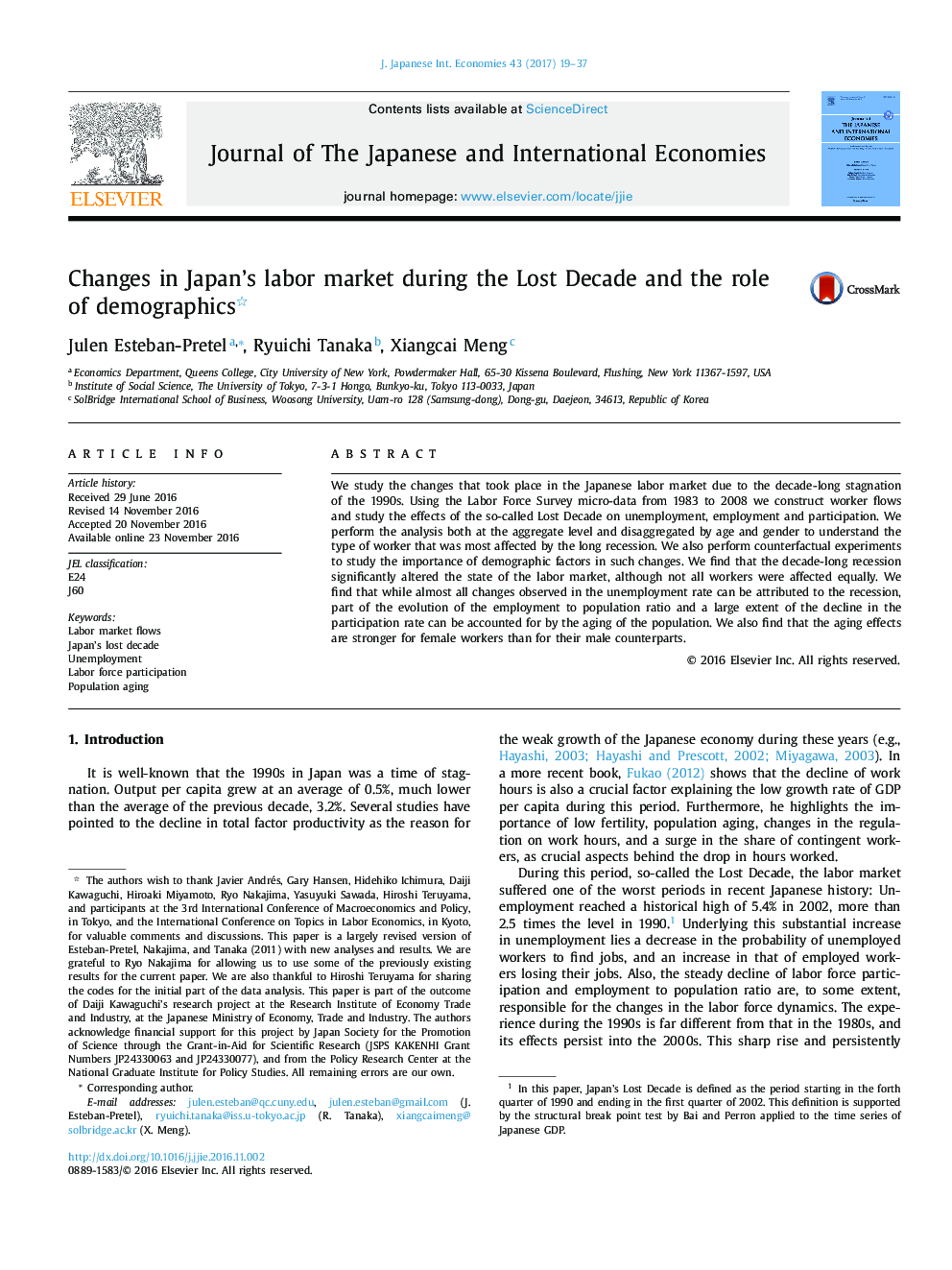| کد مقاله | کد نشریه | سال انتشار | مقاله انگلیسی | نسخه تمام متن |
|---|---|---|---|---|
| 5101234 | 1479194 | 2017 | 19 صفحه PDF | دانلود رایگان |
عنوان انگلیسی مقاله ISI
Changes in Japan's labor market during the Lost Decade and the role of demographics
ترجمه فارسی عنوان
تغییرات در بازار کار ژاپن در طول دهه از دست رفته و نقش جمعیت شناسی
دانلود مقاله + سفارش ترجمه
دانلود مقاله ISI انگلیسی
رایگان برای ایرانیان
کلمات کلیدی
ترجمه چکیده
ما تغییرات را که در بازار کار ژاپن اتفاق افتاده است به دلیل رکود دهه گذشته دهه 1990 مطالعه می کنیم. با استفاده از داده های میکرو داده های تحقیق کارگری از سال های 1983 تا 2008، جریان های کارگر را بنا می کنیم و اثرات به اصطلاح دهه از دست رفته را بر بیکاری، اشتغال و مشارکت بررسی می کنیم. ما تجزیه و تحلیل هر دو را در سطح کلان انجام می دهیم و با سن و جنسیت تقسیم بندی می کنیم تا نوع کارگرانی که بیشتر از رکود طولانی تحت تاثیر قرار گرفته اند را درک کنیم. ما همچنین آزمایشهای متقابل را انجام میدهیم تا اهمیت عوامل جمعیت شناختی را در چنین تغییراتی بررسی کنیم. متوجه می شویم که رکود دهه ها به طور قابل ملاحظه ای وضعیت بازار کار را تغییر داد، اگرچه تمام کارگران به طور مساوی تحت تأثیر قرار نگرفتند. ما دریافتیم که تقریبا تمام تغییراتی که در نرخ بیکاری دیده می شود می تواند به رکود مربوط شود، بخشی از روند رشد اشتغال به جمعیت و میزان زیادی از کاهش در نرخ مشارکت می تواند به دلیل پیری جمعیت . ما همچنین می بینیم که اثرات پیری برای کارگران زن قوی تر از همتایان مردشان است.
موضوعات مرتبط
علوم انسانی و اجتماعی
اقتصاد، اقتصادسنجی و امور مالی
اقتصاد و اقتصادسنجی
چکیده انگلیسی
We study the changes that took place in the Japanese labor market due to the decade-long stagnation of the 1990s. Using the Labor Force Survey micro-data from 1983 to 2008 we construct worker flows and study the effects of the so-called Lost Decade on unemployment, employment and participation. We perform the analysis both at the aggregate level and disaggregated by age and gender to understand the type of worker that was most affected by the long recession. We also perform counterfactual experiments to study the importance of demographic factors in such changes. We find that the decade-long recession significantly altered the state of the labor market, although not all workers were affected equally. We find that while almost all changes observed in the unemployment rate can be attributed to the recession, part of the evolution of the employment to population ratio and a large extent of the decline in the participation rate can be accounted for by the aging of the population. We also find that the aging effects are stronger for female workers than for their male counterparts.
ناشر
Database: Elsevier - ScienceDirect (ساینس دایرکت)
Journal: Journal of the Japanese and International Economies - Volume 43, March 2017, Pages 19-37
Journal: Journal of the Japanese and International Economies - Volume 43, March 2017, Pages 19-37
نویسندگان
Julen Esteban-Pretel, Ryuichi Tanaka, Xiangcai Meng,
